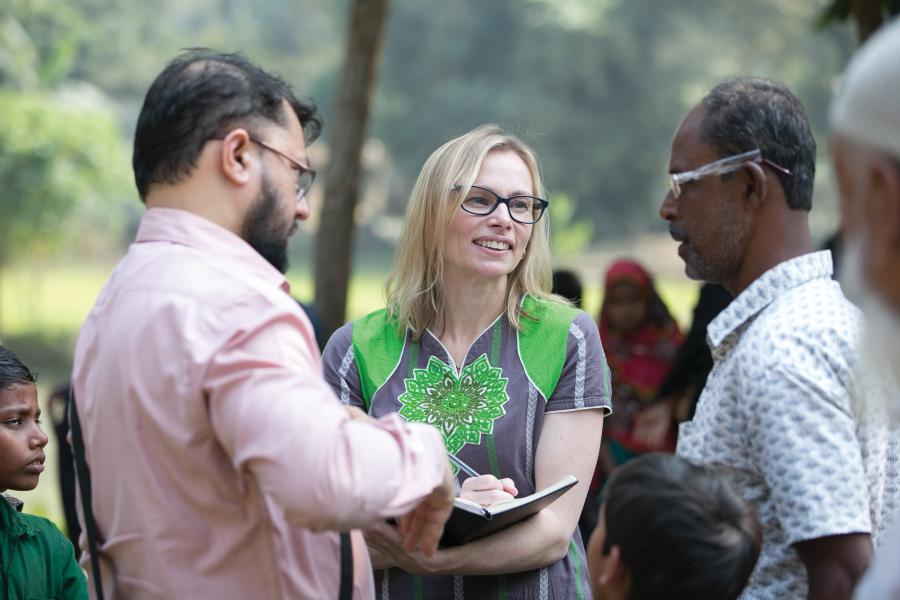Ella Gudwin, SAIS '04 (MA), is the CEO of VisionSpring, a company that sells affordable eyewear. But her career as a social entrepreneur has taken many turns. Before joining VisionSpring, she was the vice president of strategy and program development at Americares, a nonprofit assisting those impacted by poverty and disaster. Prior to that, she helped manage access to health interventions in 10 countries, as head of foreign government and board relations at the Population Council. Now, she helms an organization that has corrected the vision of 12 million people living on less than $4 per day.
Gudwin is passionate about the ways organizations can drive social impact through business models that blend earned revenue with philanthropy. Here, Gudwin tells us about her childhood, why social enterprise matters, and how she stays focused when the road is challenging.
Where did your passion for international development begin?
When I was 5 years old, I visited Sri Lanka and had my first exposure to deep poverty. In high school, I was able to travel to Costa Rica, which was impactful. Then, in college, I studied abroad in Indonesia.
In 1995, when I was in Indonesia, I interviewed women about their experiences with family planning and what it meant to have control over their family size. I couldn't have imagined this future I have now walked, but I was on the path.
Why does VisionSpring's mission align with your own?
The world has a lot of complicated problems, but eyeglasses aren't complicated. A billion people don't have the glasses they need. This problem is solvable! We know what the challenges are, and we know how to make this 700-year-old technology more available.
I also find that working in social enterprise is uniquely fun. Every day, I sit in that constructive tension of being purpose-driven while also borrowing inspiration from other business models. Living in the gray space suits me: I get to ask, "How do we deploy a business model against this problem?" with a clear North Star. It's intellectually stimulating to focus on one problem and actually have the latitude to tackle it from many angles.
Tell us about a high point in your career.
In April, we had a randomized control trial published in PLOS ONE about the impact of eyeglasses on income for people living in rural Bangladesh. The simple intervention of reading glasses, even for people who weren't literate, was able to lift income by 33.4%. The story was picked up by The New York Times, and I walked out of my apartment to pick up the paper. I sat there looking at the study results alongside a photo that a team took, featured in that prominent newspaper. I thought: 21-year-old me would be so proud.
Tell us about a challenging moment in your career.
COVID-19 was a unique leadership challenge. I came from an emergency response background, and I had a certain level of pattern recognition in March of 2020. I didn't want to wait for the new normal. I wanted VisionSpring to respond. So within days, we pivoted our entire supply chain to procure and distribute personal protective equipment. We commissioned mask orders from women-owned cooperatives, conducted infection prevention campaigns, and kept our staff employed. Our donors stayed close, too.
It felt like a huge win because we could support the communities we were invested in, but we came back to our glasses work quickly, too.
Many people become disillusioned and step away from impact-driven work. What keeps you engaged?
I celebrate the small milestones. You know what they say: Big changes, small steps. I often think about how our community health worker program just finished screening the vision of 10 million people and correcting vision for 2 million of them. This kind of stuff keeps me engaged; the small milestones add up!
What legacy do you hope to leave?
I hope I can be an example of stubborn optimism. I also hope other people can learn from VisionSpring's mistakes and achieve big, ambitious outcomes faster than we did.
What have you learned about entrepreneurship from your time at VisionSpring?
People also ask a lot about how to be innovative. And I believe that innovation is rooted in a discipline of constant iteration. Through cumulative experience, you get a pop—all of a sudden, you can put something together in a new way that gets you to a big change. But that commitment to constant adaptation and relentless improvement is what actually drives innovation.








